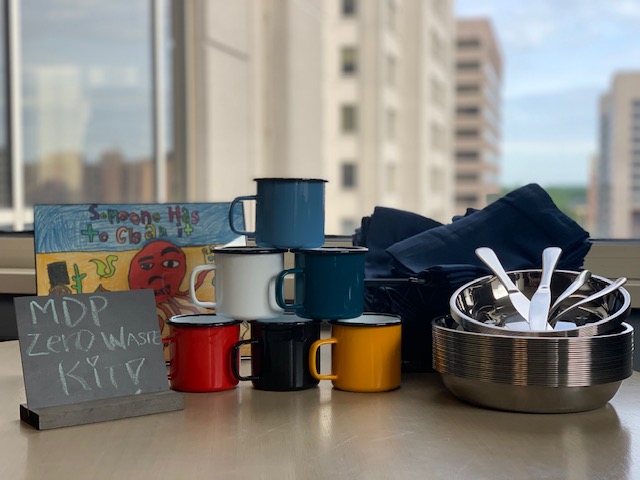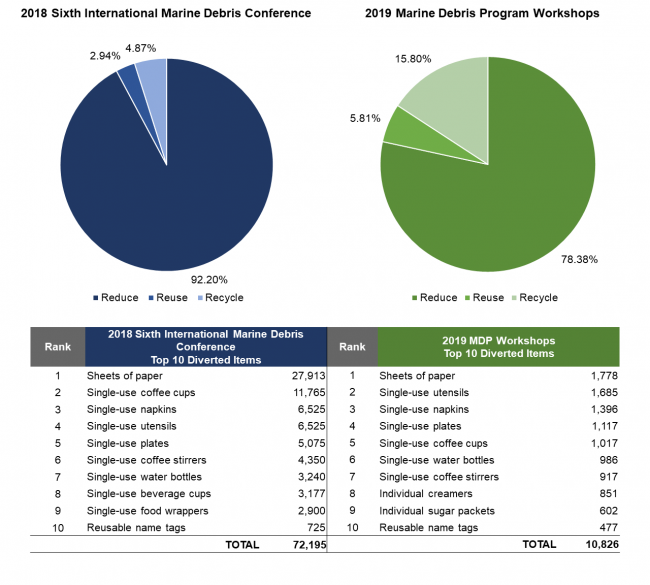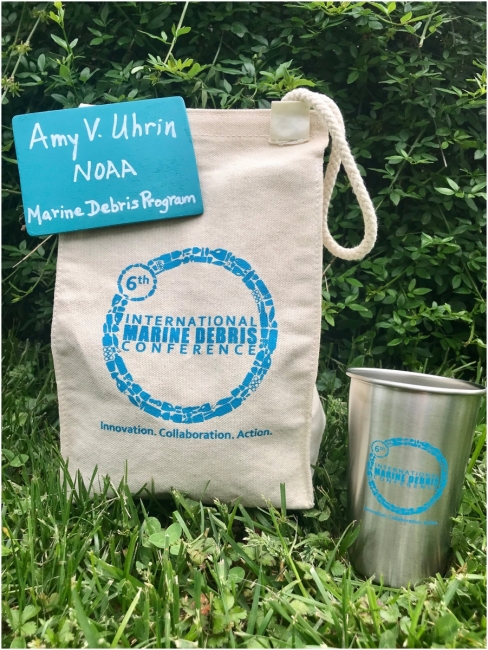Although we are not attending in-person events right now, conferences and other large events can generate large amounts of waste from food and beverage, registration, travel, lodging, giveaways, and other activities. At the NOAA Marine Debris Program, we recognize that environmental organizations and scientists have a particular responsibility to reduce the amount of waste generated through these events. In an article recently published in the journal Marine Pollution Bulletin, the NOAA Marine Debris Program’s Amy V. Uhrin, Demi Fox, Carlie Herring, Christy Kehoe, Sarah Latshaw, and Sherry Lippiatt, as well as the NOAA National Environmental Satellite, Data, and Information Service’s Amanda Laverty, all members of the Sixth International Marine Debris Conference (6IMDC) Zero Waste Working Group, highlight our commitment to “walking the talk” by reducing waste at events and preventing potential sources of marine debris. The article reviews the 6IMDC’s zero waste initiatives and provides suggestions for other conference planners to incorporate waste reduction into their own planning efforts.
The definition of zero waste is still evolving and can be defined in multiple ways. One general understanding is that zero waste is a spectrum of actions toward producing no waste, but shows a commitment to working toward attainable goals for reducing and minimizing waste. With this in mind, the 6IMDC Zero Waste Working Group, established and run by the NOAA Marine Debris Program, implemented a multitude of zero waste initiatives at the 6IMDC, a five-day event co-organized by NOAA and United Nations Environment with over 725 attendees in March of 2018. Through two years of planning, the 6IMDC Zero Waste Working Group incorporated initiatives that avoided the use of 76,300 single-use items and substantially reduced the conference venue’s typical weekly amount of landfill waste -- largely by recycling nearly 530 pounds of conference materials, composting 6,900 pounds of food scraps, and donating excess food to support 300 meals through Chefs to End Hunger.
After a successful event, the 6IMDC Zero Waste Working Group compiled and shared lessons learned into the Zero Waste Planning Guide for Large-scale Events and/or Conferences. Further, the working group continued to strive for zero waste at all NOAA Marine Debris Program-hosted events following the 6IMDC. The team gathered supplies to build a “zero waste kit”, which contains reusable plates, utensils, mugs, cloth napkins, and wooden name tags. Throughout 2019, the zero waste kit was shipped to NOAA Marine Debris Program regional offices across the country as a replacement to single-use supplies that would have otherwise been needed for thirteen workshops. By using the shared zero waste kit, the Program further eliminated the need for more than 12,000 individual disposable items.

Following the momentum from the 6IMDC, a broader Zero Waste Initiative was established within NOAA’s National Ocean Service (NOS) in 2019. Representatives from each office within NOS actively meet throughout the year to discuss ways to continue reducing waste at events, as well as in daily operations. There are now 45 zero waste kits and counting, which are used at NOAA offices around the nation. Though we are not hosting in person events right now, these resources will be used for future NOS-led and supported events.The NOS Zero Waste Team hopes to continue fostering a culture of waste reduction within NOAA, and provide resources and encouragement to those who would like to “walk the talk” and start initiatives of their own.
Interested in learning more about reducing waste at conferences and events? Read the full Marine Pollution Bulletin article for more information on the zero waste efforts at the 6IMDC and lessons learned by the NOAA Marine Debris Program team.


